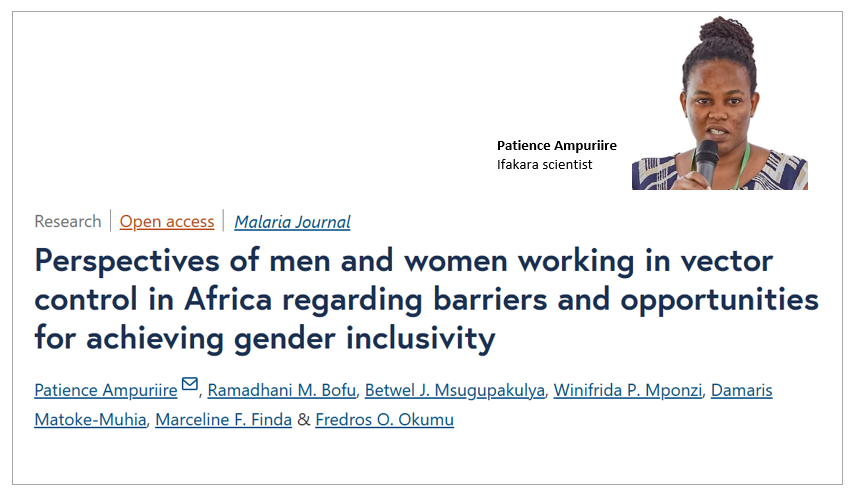
GENDER: Women still left out of mosquito control frontlines

Despite growing efforts to promote gender equality in public health, a new study by the Ifakara Health Institute has found that women across Africa continue to face major barriers in participating and leading mosquito control programs.
The research, published on Malaria Journal, highlights persistent gender inequalities in vector control—an area historically dominated by men. Drawing from research in Tanzania and survey data from 150 vector control professionals across 16 African countries, the study reveals how cultural norms, family expectations, and structural obstacles are still limiting women’s full involvement.
Led by Ifakara, study is first of its kind in Africa
According to scientists, this research is the first cross-country study in Africa to investigate how gender intersects with other factors on a personal and institutional level to shape experiences and perceptions of inclusivity among men and women working in vector control in African Institutions.
The study was led by Ifakara young scientist Patience Ampuriire, under the supervision of Drs. Marceline Finda and Fredros Okumu - both seasoned research scientists at Ifakara, with contributions from Ramadhani Bofu, Betwel Msugupakulya, Winifrida Mponzi, and Damaris Matoke-Muhia.
Male dominance in leadership roles
The study found that while women are equally qualified, often holding master’s degrees similar to their male counterparts—leadership remains largely male-driven. Around 70% of male respondents reported having held leadership roles in vector control, compared to just 40% of women.
Marriage, family, and career constraints
The research also explores how gender roles outside the workplace affect career growth. Women reported greater pressure to prioritize family responsibilities over professional demands, especially once married. 44.1% of the women surveyed were unmarried, compared to only 18% of the men, suggesting that societal expectations around marriage and caregiving may limit women’s availability for demanding roles, including overnight fieldwork.
Working in mixed teams helps, but not enough
Respondents acknowledged the advantages of mixed-gender teams, including improved community engagement and trust during campaigns. However, many said that cultural and institutional norms still hinder equal participation. Views were mixed on whether gender-diverse teams improved creativity, morale, or efficiency.
Leadership still influenced by gender bias
The study found that perceptions of leadership are still shaped by gender. More than half of the respondents said a manager’s gender influenced the workplace atmosphere. Some women reported feeling more supported under female leaders, who they said offered more empathy and shared understanding. These dynamics show that gender bias in leadership is still common and remains a defining factor, pointing to the slow pace of cultural change within institutions.
A call to action for gender equity
The study concludes with a clear message: to make real progress in disease control and public health, gender inclusivity in vector control programs must move beyond rhetoric. This includes practical solutions, like flexible work arrangements, mentorship programs for women, and institutional support for working in the field. The study also calls for more effort to change cultural norms that hold women back.
"Although the value of inclusivity is broadly recognized, cultural norms, family demands, and social expectations still weigh more heavily on women," the study concludes. "These challenges can be addressed by incorporating a gender lens, considering the perspectives of both men and women in vector control."
Read the full publication here.
